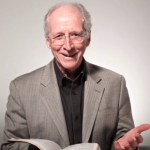Vern S. Poythress has written what could well prove to be a very helpful article on the present day “gifts” of the Spirit, unhealthy found here.
Monthly Archives: October 2013
The Tree of the Knowledge of Good and Evil
 Of the many trees in the Garden, God banned Adam and Eve from eating from one — just one (Genesis 2:16–17, 3:1–3, 11). Why?
Of the many trees in the Garden, God banned Adam and Eve from eating from one — just one (Genesis 2:16–17, 3:1–3, 11). Why?
Dr. John Piper recently gave the question some fresh thinking, which he shares in an episode of Ask Pastor John:
The function of the tree of the knowledge of good and evil is to make sure that the pleasures of all the other trees in the garden are supremely pleasures in God.
The command went like this: “And the LORD God commanded the man, saying, ‘You may surely eat of every tree of the garden, but of the tree of the knowledge of good and evil you shall not eat, for in the day that you eat of it you shall surely die’” (Genesis 2:16–17).
So what was God saying in prohibiting the eating of one tree out of a million trees? He was saying, “I have given you life. I have given you a world full of pleasure, pleasures of taste and sight and sound and smell and feel and nourishment. Only one tree is forbidden to you. And the point of that prohibition is to preserve the pleasures of the world, because if you eat of that one you will be saying to me, ‘I’m smarter than you. I am more authoritative that you. I am wiser than you are. I think I can care for myself better than you care for me. You are not a very good Father. And so I am going to reject you.’ So don’t eat from the tree, because you will be rejecting me and all my good gifts and all my wisdom and all my care. Instead, keep on submitting to my will. Keep on affirming my wisdom. Keep on being thankful for my generosity. Keep on trusting me as a Father and keep on eating these trees as a way of enjoying me. There are 10,000 trees, every imaginable fruit. Just go eat. Be thankful. I have given them to you and see them as expressions of my goodness and savor them that way.”
And Satan comes along, and he takes that arrangement and says, “Hey, Eve, the meaning of that arrangement is: God is selfish. God is stingy. He is a skinflint.” So he took the prohibition of one suicidal tree and treated it as a prohibition of everything.
So the issue of the tree is this: Will we keep looking to God as the giver and lover and treasure of this garden so that all our eating is thanking and all our savoring is a savoring of God? Will we keep on experiencing every one of these tastes as a tasting of something like what God is, and in that sense a tasting of God? Will we keep on enjoying God in the enjoying of the trees?
That is what the forbidden tree was there to test.
I think a lot of people try to set that up as merely arbitrary: Will man obey? Or will he not obey? And they don’t put it in the context of his fatherly care and all the goods that he has given. I don’t think it is arbitrary like that.
It was a warning. “If you choose independence instead of God-dependence, you will lose the pleasure of the garden and God with it.”
“If you keep trusting me and enjoying me as your greatest delight and highest treasure, you will have this garden and I will be the pleasure of all your pleasures.”
The forbidding one tree is a way of securing that the pleasures of all the other trees in the garden are supremely pleasures in God.
Heaven for Eternity?
 In an article entitled “Where God’s People Go When They Die,” Randy Alcorn writes:
In an article entitled “Where God’s People Go When They Die,” Randy Alcorn writes:
Brothers, we do not want you to be ignorant about those who fall asleep, or to grieve like the rest of men, who have no hope. — 1 Thessalonians 4:13
When Marco Polo returned to Italy from the court of Kublai Khan, he described a world his audience had never seen—one that could be understood only through the eyes of imagination. Not that China was an imaginary realm, but it was very different from Italy. Yet, as two locations on planet Earth inhabited by human beings, they had much in common. The reference points of Italy allowed a basis for understanding China, and the differences could be spelled out from there.
The writers of Scripture present Heaven in many ways; for instance, as a garden, a city, a country, and a kingdom. We’re familiar with gardens, cities, countries, and kingdoms; they serve as mental bridges to help us understand Heaven.
Usually when we refer to Heaven, we mean the place where Christians go when they die. When we tell our children, “Grandma’s now in Heaven,” we’re referring to the intermediate, or present, Heaven. The term intermediate doesn’t mean it is halfway between Heaven and Hell, in some kind of purgatory or second-rate place. The intermediate Heaven is fully Heaven, fully in God’s presence, but it is intermediate in the sense that it’s temporary, not our final destination. Though it is a wonderful place, and we’ll love it there, it is not the place we are ultimately made for, and it is not the place where we will live forever. God has destined his children to live as resurrected beings on a resurrected Earth.
So, as wonderful as the intermediate Heaven is, we must not lose sight of our true destination, the New Earth, which will also be in God’s presence (because that’s what Heaven is, the central place of God’s dwelling).
Will Christians live in Heaven forever? The answer depends on what we mean by Heaven. Will we be with the Lord forever? Absolutely. Will we always be with him in exactly the same place that Heaven is now? No.
In the present Heaven, everyone is in Christ’s presence, and everyone is joyful. But everyone is also looking forward to Christ’s return to Earth, when they will experience their resurrection and walk on the earth again.
It may seem strange to say that the Heaven we go to at death isn’t eternal, but it’s true. Let me suggest an analogy to illustrate the difference between the intermediate Heaven and the eternal Heaven. Suppose you live in a homeless shelter in Miami. One day you inherit a beautiful house in Santa Barbara, California, fully furnished, on a gorgeous hillside overlooking the ocean. With the home comes a wonderful job doing something you’ve always wanted to do. Not only that, but you’ll also be near close family members who moved from Miami many years ago.
On your flight to Santa Barbara, you’ll change planes in Denver, where you’ll spend an afternoon. Some other family members, whom you haven’t seen in years, will meet you at the Denver airport and board the plane with you to Santa Barbara, where they have inherited their own beautiful houses on another part of the same vast estate. Naturally, you look forward to seeing them. Now, when the Miami ticket agent asks you, “Where are you headed?” would you say, “Denver”? No. You would say, “Santa Barbara,” because that’s your final destination. If you mentioned Denver at all, you would say, “I’m going to Santa Barbara by way of Denver.”
When you talk to your friends in Miami about where you’re going to live, would you focus on Denver? No. You might not even mention Denver, even though you will be a Denver-dweller for several hours. Even if you left the airport and spent a day or a week in Denver, it still wouldn’t be your focus. Denver is just a stop along the way. Your true destination—your new long-term home—is in Santa Barbara.
Similarly, the Heaven we will go to when we die, the intermediate Heaven, is a temporary dwelling place. It’s a wonderfully nice place (much better than the Denver airport!), but it’s still a stop along the way to our final destination: the New Earth. It will be great to see friends and family in the present Heaven whom we haven’t seen for a while. But like us, they will be looking forward to the resurrection, after which we will actually live on the estate that God is preparing for us.
Another analogy is more precise but also more difficult to envision, because for most of us it’s outside our experience. Imagine leaving the homeless shelter in Miami and flying to the intermediate location, Denver, and then turning around and going back to your city of origin, which has been completely renovated—a New Miami. In this New Miami, you would no longer live in a homeless shelter but in a beautiful house in a glorious pollution-free, crime-free, sin-free city. So you would end up living not in a new home but in a radically improved version of your old home.
This is what the Bible promises us—we will live with Christ and one another forever, not in the present Heaven, but on the New Earth, which God will make into Heaven by virtue of the location of his throne and his presence, and where he will forever be at home with his people.
